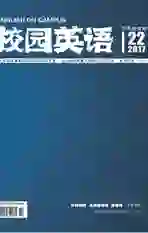Students should be encouraged to challenge teachers
2017-08-04王肖莲
王肖莲
Introduction
The aim of this paper is to demonstrate whether challenging authority benefits critical pedagogy. In this article, my main understanding of critical pedagogy is based on the critical educational theorist Henry Girous. The paper will first introduce the necessity of authority in promoting a democratic society. Then, the article will analyse why students have a right to suspect the teacher and why it is necessary to refuse to obey the all rules set by them.
The right and necessity of challenging authority
Integrated these two articles, the first argument is encouraging students to challenge authority is an effective way to enable students to believe in authority and then defer to authority. According to Bizzell, the beginning of the exercise of authority lies in persuasion: A must persuade B that if B grants A authority over B, Bs best interests ultimately will be serve (1991: 57). Challenging authority is the first step to make the students to grant authority as self-persuasion will be generated when students challenge authority. It is justifiably say that the power of authority is based on self-persuasion. During challenge, students will find out whether the authority can serve their best interest. The process of challenging is essential for students as it is the process that students to find out the reason why the authority exists and how they can benefit from the authority.
In preventing students from suspecting authority, there might be more infraction of discipline, for example, the moral covert resistance caused by discrimination hushing. Students choose covert resistance since their self-persuasion havent been completed yet. They still believe their behaviours are more rational than the rules. Even though the teacher use his or her power to hush the class, some students might resist it as they are still in the complying level. Once they are empowered to discuss their dilemma caused by discrimination hushing, they would know that their behaviour also might be against moral norms- talking in the class might disturb other students, even you are helping others. Thus, they might know the importance of the rule, providing a quiet surrounding for all the students. In brief, encouraging students to challenge authority actually means that motivating them to start self-persuasion is a means to establish the power of authority in their mind.
Encouraging students to challenge teachers can promote the development of critical pedagogy. The aim of critical pedagogy is to generate citizen with critical ability and develop a democratic society. This society requires students to be critically attentive to the issues of public responsibility, personal freedom, and democratic tolerance, as well as to the necessity of rejecting norms and practices that embody and extend the interests of domination, human suffering, and exploitation (1991: 59). During the process of critique development, the essence is to attack the oppression.
Another reason why students need to challenge teacher is it will help the teachers to evaluate their critical pedagogy. In the past, knowledge was fragmented and adopted via invariable progress by using the same teaching material and a single evaluation system. This pedagogy theoretically assumes that teacher should be submitted themselves to the government and they need to teach the students in accordance with governments will. Under this pedagogy, the teachers ability of reflection will decrease and teaching becomes part of the routine. The first one is the teacher might dont know what to do as the aim of critical pedagogy is hard to evaluate. Another one is, the excess utility might cause coercion, which is against the definition of critical pedagogy, delineating forms of pedagogy that imitate and generate egalitarian social power relations (Bizzell, 1991: 55).
The last argument is the authority might be against moral education when students are not allowed to challenge their teachers. Two dimensions will be given to explain this argument. Firstly, the idea that unfairness is ubiquitous and accepted is imparted in students involuntarily during the process of convincing authority. Secondly, blind obedience caused by authority might hardly promote students to develop moral understanding. Due to the fact that coercion existed in authority; sometimes students have to do something they repulse.The impact on moral education caused by blind obedience is the understanding and consciousness of morality will decrease. This study was intended to find out whether students should be encouraged to challenge teachers. The results showed that students are entitled to challenge teacher and it is vital to do so during teaching process.
References:
[1]Bizzell,P.(1991)‘Power,Authority and Critical Pedagogy, Journal of Basic Writing,10(2)54-70.
[2]Thornberg,R.(2006)‘Hushing as a moral dilemma in the Classroom”,Journal of Moral Education,35(1),89-104.
